London Mayor Sadiq Khan will increase the capital’s Congestion Charge by 20 per cent from January – and electric vehicle owners will need to cough up too for the first time in 23 years.
Drivers in Central London will be required to fork out £18 per day from 2 January 2026 when the charge rises from £15, Transport for London announced on Thursday.
It’s the first hike since 2020.
The rise means the daily cost of driving an older car in the capital – when combined with the £12.50 Ultra-Low Emission Zone charge – will amount to an eye-watering £30.50.
And someone driving into central London for 253 days – the average number of working days in a year – would find themselves paying £759 more than they were in 2025.
TfL will also scrap the charge’s 100 per cent Cleaner Vehicle Discount that has provided exemption to EVs since 2003 and instead replace it with a new tiered system in the latest snub for electric car owners.
It comes just a week after reports emerged that EV drivers could be forced to pay 3p-a-mile taxation under new plans being drawn up by the Chancellor ahead of an announcement in next week’s Autumn Budget statement.
Mayor Khan in a statement on Thursday insisted it is essential the scheme ‘stays fit for purpose’ amid a sharp rise in the number of EVs on the road. But motoring experts blasted the decision as a ‘backward step’ that could make electric car ownership less appealing.
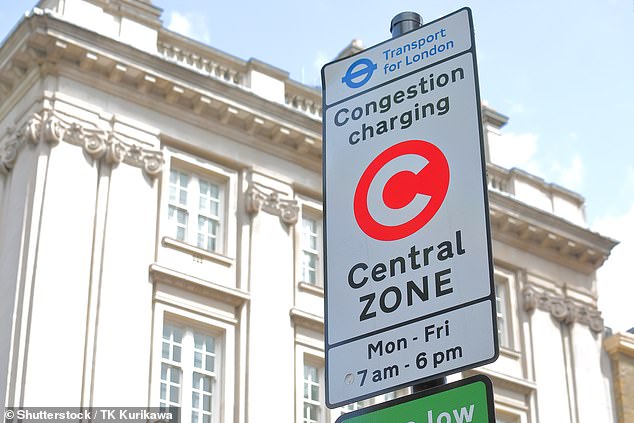
Transport for London has confirmed that the Congestion Charge in the capital will increase by 20% to £18-a-day from 2 January 2026
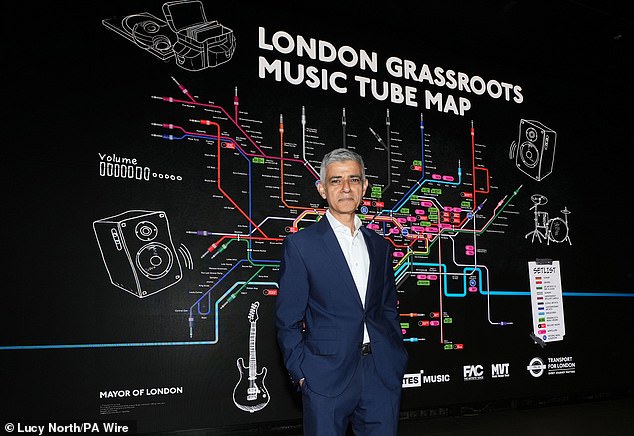
100% Congestion Charge discounts for EVs will also be reduced to just 25% from the beginning of next year, meaning electric car owners need to pay £13.50 a day to enter the zone. Mayor Khan in a statement on Thursday this was to ensure the scheme ‘stays fit for purpose’ amid a sharp rise in the number of EVs on the road
From 2 January, EVs owners will be forced to pay £13.50 per day when driving into Central London with a new 25 per cent congestion charge discount applied.
However, only those registered to TfL’s Auto Pay system receive the discount.
Drivers of electric vans, HGVs and quadricycles will receive a 50 per cent concession, bringing the price down to £9 per day.
And in a further blow, from 2030 the discounts will be reduced again to 12.5 per cent for electric cars and 25 per cent for vans, HGVs and quadricycles.
There is also bad news for anyone hoping to move into the congestion zone – which runs from Mayfair to Tower Bridge east to west and from Euston Road in the north to Vauxhall in the south – with discounts for petrol and diesel cars scrapped for new residents.
While anyone who lives within the charging zone – and is in receipt of the Residents’ Discount prior to 1 March 2027 – will still receive their 90 per cent reduction regardless of vehicle fuel type, any new applications from residents who move into the area after 1 March 2027 will only get the 90 per cent discount if they own an EV.
Residents with low incomes and disabled residents will still be able to apply for the Residents’ Discount irrespective of the type of vehicle they own, but only up until March 2030.
Some 136,000 residents are estimated to live within the zone currently.
There will also now be a new 100 per cent discount for ‘back to base’ electric car club vehicles, though on if the EV is returned to the same marked parking space within the zone.
‘This will give residents – including those on low incomes without EV access – an option to use one for essential car journeys,’ TfL says.
Auto Express has estimated that the £3 congestion charge increase and introduction of discounted EV charges will generate between £80million and £91million extra each year for TfL coffers; a total of £415million to £455million over five years.
The congestion charge zone covers an area of central London between 7am and 6pm on weekdays, and between noon and 6pm on weekends and bank holidays. There is no charge between Christmas Day and New Year’s Day.
All roads around the perimeter are enforced by Automatic Number Plate Recognition cameras.
When introduced in 2003, the daily charge was just £5. In 2010 it was doubled to £10 and it rose again in 2014 to £11.50.
When the charge was last hiked in June 2020, it jumped by 30 per cent to £15.
Proposals to increase the charge by another 20 per cent from next year were revealed back in May.
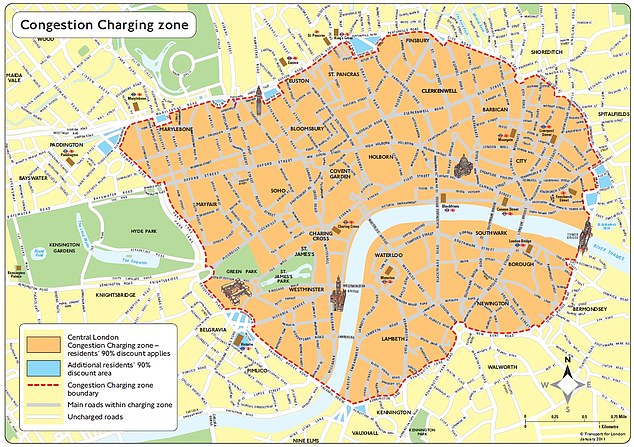
The Zone covers approximately the area from Kings Cross in the north to Vauxhall in the south, and Paddington in the west to Whitechapel in the east. It was introduced in 2003 by Ken Livingstone
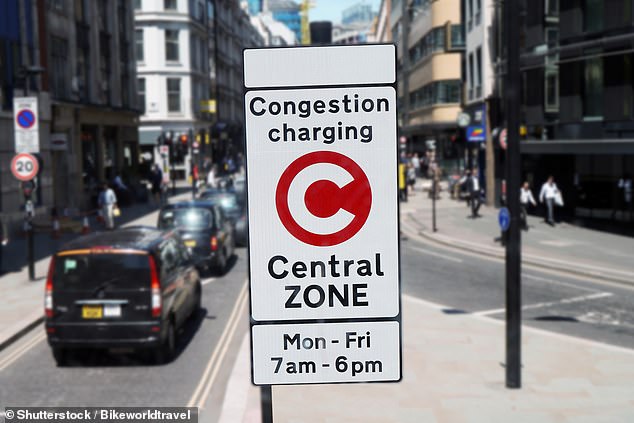
Next year’s rise means the daily cost of driving an older car in the capital – when combined with the £12.50 Ultra-Low Emission Zone charge – will amount to an eye-watering £30.50
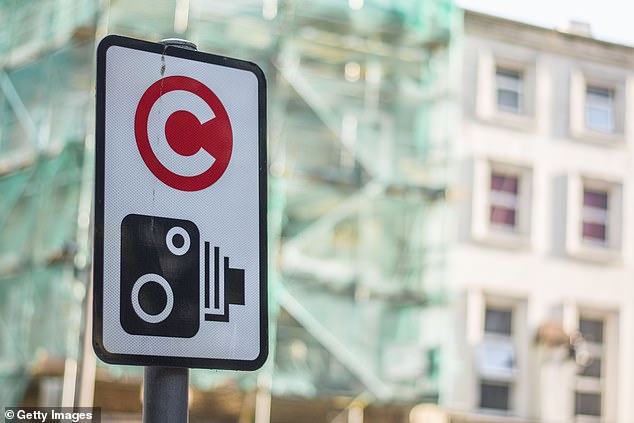
The congestion charge zone covers an area of central London between 7am and 6pm on weekdays, and between noon and 6pm on weekends and bank holidays. All roads around the perimeter are enforced by Automatic Number Plate Recognition cameras
Another ‘confusing signal’ about the switch to EVs
Motoring groups and experts have slammed the move to charge electric vehicle owners to enter London’s congestion zone from next year.
AA president Edmund King on Thursday morning urged the Mayor to reverse his decision.
He said: ‘This is a backward step which sadly will backfire on air quality in London.
‘Many drivers are not quite ready to make the switch to electric vehicles, so incentives are still needed to help them over the line.
‘The mayor needs to reconsider to continue to help more essential van and car journeys in the capital go electric.’
Ginny Buckley, the chief executive of EV advice website Electrifying.com, said: ‘It’s far too soon for TfL to remove exemptions for electric vehicles from the London congestion charge.
‘This policy sends a confusing signal. You can’t champion clean air while penalising the vehicles that deliver it.’
Toby Poston, chief executive at the British Vehicle Rental and Leasing Association (BVRLA), said the decision to make EV owners pay the capital’s congestion charge will be a ‘hammer blow’ for thousands of drivers.
‘Electric vehicle adoption is still at a fragile stage and EV users already face huge hurdles in terms of public charging costs and accessibility.
‘Removing the 100 per cent discount could not only stall the transition; it could push people the other way.’
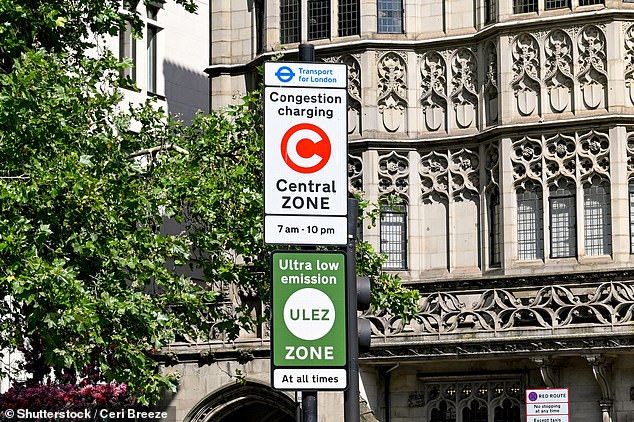
Drivers of electric cars, who currently travel free in the Congestion Charge Zone will have to pay £13.50 per day to enter Central London under the new rules imposed from 2 January 2026
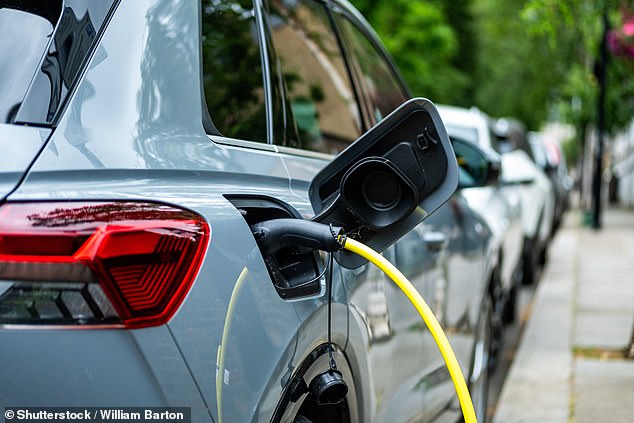
Existing residents within the zone will hold onto their discounts – but anyone moving to the area after March 2027 will only be eligible for one if they drive an electric car
TfL says EVs will account for nearly a fifth of all vehicles in the congestion charging zone by the end of this year.
Without the changes, it has estimated there could be more than 2,000 additional vehicles driving during operating hours in the zone on an average weekday.
London’s transport department said this would ‘undermine the benefits’ of the scheme by causing ‘more queues and delays’.
Sir Sadiq said: ‘Keeping London moving by reducing congestion is vital for our city and for our economy.
‘While the congestion charge has been a huge success since its introduction, we must ensure it stays fit for purpose, and sticking to the status quo would see around 2,200 more vehicles using the congestion charging zone on an average weekday next year.
‘We must support Londoners and businesses to use more sustainable travel, so I’m pleased that substantial incentives will remain in place for Londoners who switch to cleaner vehicles, as we work to build a greener and better London for everyone.’
In a snap Auto Express poll of 1,087 drivers, four in five believed the hike to £18 a day is ‘unfair’.
More – 85 per cent – said that motorists are unfairly being targeted by government and local authority transport policies, while half admitted to avoiding particular cities and routes to duck rising tolls and charges.
However, on the decision to end congestion charge exemption for EV owners, drivers were split: 38 per cent said electric cars should have to pay, while 33 per cent believed they shouldn’t.
Christina Calderato, TfL’s director of strategy, said the changes from 2 January 2026 ‘strike a careful balance that enables drivers, businesses and other organisations to continue transitioning to cleaner vehicles and more sustainable forms of transport’.
Last week it emerged that Chancellor Rachel Reeves will announce road pricing for electric cars in her speech delivered to the Commons on 26 November.
Ms Reeves is expected to rubberstamp road pricing for 2028, pending a public consultation.
EV owners are expected to be charged 3p for every mile they travel, on top of the £195-a-year VED rate electric car drivers now have to pay since April this year under new measures that ended EV exemption from car tax.
Dubbed by government insiders as ‘VED+’, for EV owners covering an average of 10,000 miles per year, their total annual tax outlay will be £495; £300 in per-mile charges and £195 in standard rate VED.
Drivers of hybrid cars, which are powered by both a combustion engine and electric motors, will also have to pay the charge, but at a lower rate, it has been claimed.
It’s estimated that it would help the Treasury raise an estimated £1.8billion by 2031.
